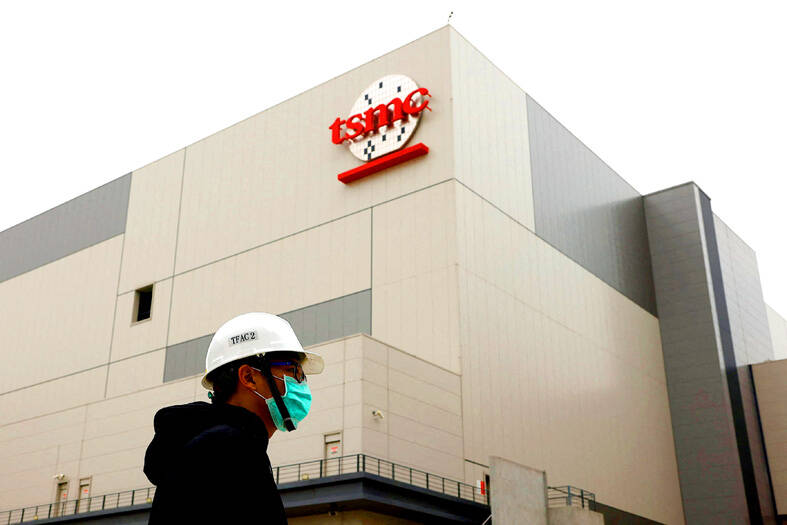Taiwan Semiconductor Manufacturing Co (TSMC, 台積電), the world’s largest contract chipmaker, last year remained the most profitable company in Taiwan, Taipei-based credit information company CRIF (中華徵信所) said.
Hon Hai Precision Industry Co (鴻海精密), a major iPhone assembler also known as Foxconn (富士康), generated the most in sales in the country last year, CRIF said in its latest top-5,000 company report.
Last year, the top 5,000 companies in Taiwan, comprised of entities in the public and private sectors, posted NT$3.58 trillion (US$110.2 billion) in combined net profit, down 17.72 percent from a year earlier, while their aggregate revenue totaled NT$40.55 trillion, down 6.05 percent year-on-year.

Photo: Ann Wang, Reuters
The decline in net profit and sales is largely related to high inflation and inventory adjustments in the global supply chains, CRIF said.
As Taiwan is a major supplier of the world’s high-tech gadgets, the country is prone to the impact from global economic weakness, it added.
A total of 2,082 Taiwanese companies saw their sales falling year-on-year last year, while 1,107 businesses enjoyed growth in sales and net profit, it said.
Out of the 1,107 companies, 664 generated more than NT$1 billion in sales each, accounting for 59.98 percent, it said.
Among the top 5,000 firms in Taiwan, TSMC, which boasts advanced chip production technologies, raked in NT$838.5 billion last year, keeping the title as the most profitable company in Taiwan, it said.
Hon Hai was second after registering NT$142.1 billion in net profit, ahead of smartphone IC designer MediaTek Inc (聯發科, NT$77 billion), Fubon Financial Holding Co (富邦金控, NT$65 billion) and United Microelectronics Corp (聯電, NT$61 billion), CRIF said.
Other profitable companies last year included CTBC Financial Holding Co (中信金控, NT$57.6 billion), Cathay Financial Holding Co (國泰金控, NT$51.5 billion), CTBC Bank (中國信託銀行, NT$41.3 billion), contract notebook computer maker Quanta Computer Inc (廣達, NT$39.7 billion) and telecom services provider Chunghwa Telecom Co (中華電信, NT$36.9 billion).
Cathay Financial rose from 11th spot in 2022 to No. 7 last year, Quanta Computer returned to the top 10 for the first time since 2013; and Chunghwa Telecom rose back to the top 10 list after being absent for two years, according to CRIF.
Hon Hai generated NT$3.45 billion in sales last year, the most among the 5,000 companies, with its ranking unchanged from a year earlier. It was followed by TSMC (NT$2.15 trillion); Pegatron Corp (和碩, NT$1.18 trillion) state-owned oil supplier CPC Corp, Taiwan (中油, NT$1.10 trillion), and Quanta Computer (NT$907.95 billion), CRIF said.

Nvidia Corp chief executive officer Jensen Huang (黃仁勳) on Monday introduced the company’s latest supercomputer platform, featuring six new chips made by Taiwan Semiconductor Manufacturing Co (TSMC, 台積電), saying that it is now “in full production.” “If Vera Rubin is going to be in time for this year, it must be in production by now, and so, today I can tell you that Vera Rubin is in full production,” Huang said during his keynote speech at CES in Las Vegas. The rollout of six concurrent chips for Vera Rubin — the company’s next-generation artificial intelligence (AI) computing platform — marks a strategic

REVENUE PERFORMANCE: Cloud and network products, and electronic components saw strong increases, while smart consumer electronics and computing products fell Hon Hai Precision Industry Co (鴻海精密) yesterday posted 26.51 percent quarterly growth in revenue for last quarter to NT$2.6 trillion (US$82.44 billion), the strongest on record for the period and above expectations, but the company forecast a slight revenue dip this quarter due to seasonal factors. On an annual basis, revenue last quarter grew 22.07 percent, the company said. Analysts on average estimated about NT$2.4 trillion increase. Hon Hai, which assembles servers for Nvidia Corp and iPhones for Apple Inc, is expanding its capacity in the US, adding artificial intelligence (AI) server production in Wisconsin and Texas, where it operates established campuses. This

US President Donald Trump on Friday blocked US photonics firm HieFo Corp’s US$3 million acquisition of assets in New Jersey-based aerospace and defense specialist Emcore Corp, citing national security and China-related concerns. In an order released by the White House, Trump said HieFo was “controlled by a citizen of the People’s Republic of China” and that its 2024 acquisition of Emcore’s businesses led the US president to believe that it might “take action that threatens to impair the national security of the United States.” The order did not name the person or detail Trump’s concerns. “The Transaction is hereby prohibited,”

Garment maker Makalot Industrial Co (聚陽) yesterday reported lower-than-expected fourth-quarter revenue of NT$7.93 billion (US$251.44 million), down 9.48 percent from NT$8.76 billion a year earlier. On a quarterly basis, revenue fell 10.83 percent from NT$8.89 billion, company data showed. The figure was also lower than market expectations of NT$8.05 billion, according to data compiled by Yuanta Securities Investment and Consulting Co (元大投顧), which had projected NT$8.22 billion. Makalot’s revenue this quarter would likely increase by a mid-teens percentage as the industry is entering its high season, Yuanta said. Overall, Makalot’s revenue last year totaled NT$34.43 billion, down 3.08 percent from its record NT$35.52